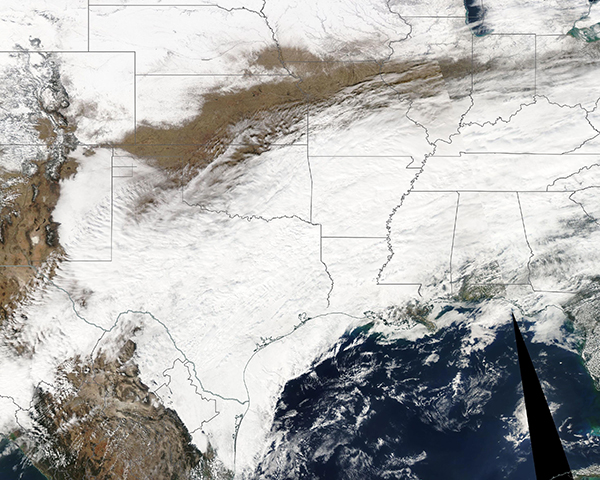Images
February 2, 2023 - Ice Storm Hits the Mid-South United States
Tweet
A swath of precipitation-bearing cloud combined with very low temperatures brought a dangerous ice storm to much of the Mid-South United States in late January and early February 2023. The Moderate Resolution Imaging Spectroradiometer (MODIS) on board NASA’s Terra satellite acquired a true-color image near the start of the wintery blast on January 31 just as ice, sleet, and freezing rains was coating streets, trees, and homes from Texas to Tennessee.
The first salvo of the storm brought up to an inch of sleet in Oklahoma, including the city of Tulsa, along with scattered bursts of lightning. Further south, the town of Denton, Texas, reported one-half inch of accumulated sleet. On that first day, sleet and freezing rain was reported as far south as San Antonio, Texas and stretched northeastward to at least Memphis, Tennessee.
The 0.10 of an inch of ice accumulation in Memphis was enough to cause slick roads, car accidents, and broken limbs, but the higher accumulations in Texas proved deadly. The storm is being blamed for 7 deaths in that state as of February 1, most as a result of traffic accidents. In addition, thick ice brought widespread gridlock, road closures, and thousands of airline flight cancellations—Dallas-Fort Worth International alone cancelled 1,300 flights. As of February 1, more than 347,000 customers are without power in Texas, with one out of every four customers in Travis County without power.
According to the Weather Channel, as of 10:00 pm EST February 1, the ice storm shows signs of intensification in localized parts of southwest Texas and Arkansas, so another tough night is expected in the Mid-South. Fortunately, temperatures are expected to begin to rise by the afternoon of February 2, turning sleet to rain and permitting the process of melting and recovery to begin.
Image Facts
Satellite:
Aqua
Date Acquired: 1/31/2023
Resolutions:
1km (1015 KB), 500m (3.1 MB), 250m ( B)
Bands Used: 1,4,3
Image Credit:
MODIS Land Rapid Response Team, NASA GSFC
Tweet
A swath of precipitation-bearing cloud combined with very low temperatures brought a dangerous ice storm to much of the Mid-South United States in late January and early February 2023. The Moderate Resolution Imaging Spectroradiometer (MODIS) on board NASA’s Terra satellite acquired a true-color image near the start of the wintery blast on January 31 just as ice, sleet, and freezing rains was coating streets, trees, and homes from Texas to Tennessee.
The first salvo of the storm brought up to an inch of sleet in Oklahoma, including the city of Tulsa, along with scattered bursts of lightning. Further south, the town of Denton, Texas, reported one-half inch of accumulated sleet. On that first day, sleet and freezing rain was reported as far south as San Antonio, Texas and stretched northeastward to at least Memphis, Tennessee.
The 0.10 of an inch of ice accumulation in Memphis was enough to cause slick roads, car accidents, and broken limbs, but the higher accumulations in Texas proved deadly. The storm is being blamed for 7 deaths in that state as of February 1, most as a result of traffic accidents. In addition, thick ice brought widespread gridlock, road closures, and thousands of airline flight cancellations—Dallas-Fort Worth International alone cancelled 1,300 flights. As of February 1, more than 347,000 customers are without power in Texas, with one out of every four customers in Travis County without power.
According to the Weather Channel, as of 10:00 pm EST February 1, the ice storm shows signs of intensification in localized parts of southwest Texas and Arkansas, so another tough night is expected in the Mid-South. Fortunately, temperatures are expected to begin to rise by the afternoon of February 2, turning sleet to rain and permitting the process of melting and recovery to begin.
Image Facts
Satellite:
Aqua
Date Acquired: 1/31/2023
Resolutions:
1km (1015 KB), 500m (3.1 MB), 250m ( B)
Bands Used: 1,4,3
Image Credit:
MODIS Land Rapid Response Team, NASA GSFC




